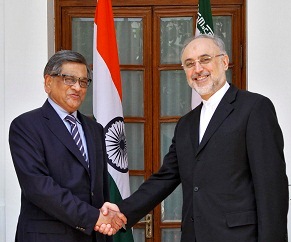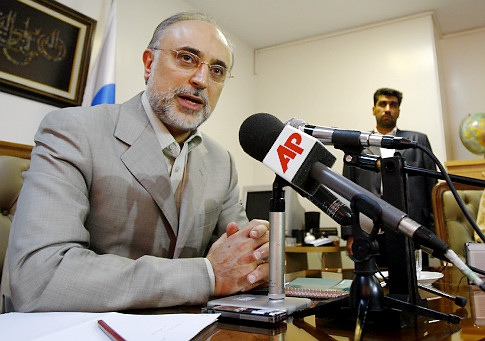 An Iranian diplomat tasked with liaising with foreign policy experts told reporters Friday he�s not very optimistic about upcoming nuclear talks, but did not rule out the prospect of a compromise on Iran�s 20% enrichment activities.
An Iranian diplomat tasked with liaising with foreign policy experts told reporters Friday he�s not very optimistic about upcoming nuclear talks, but did not rule out the prospect of a compromise on Iran�s 20% enrichment activities.�Personally speaking, I am not optimistic,� Mostafa Dolatyar, the head of the Iranian foreign ministry think tank IPIS, told reporters at the Iranian embassy in New Delhi on Friday,�Reuters reported.
�They��the six powers that comprise the P5+1, the United States, United Kingdom, France, Germany, China and Russia��have made certain connections with purely technical issues and something purely political,� Dolatyar continued. �As far as this is the mentality � from [the] 5+1�definitely there is no end for this game.�
Deputy nuclear negotiators from Iran and the P5+1 held a phone conversation Wednesday to initiate logistical planning for a new round of nuclear negotiations,�Al-Monitor reported�(December 12). Preparations for a new meeting have gotten underway as the six powers have been�debating how to update a proposal� on curbing Iran�s higher 20% enrichment work, first presented to Iran at a meeting in Baghdad last May.
�The package has the same bone structure, but with some slightly different tattoos,� a senior US official was cited by the�Washington Post�Friday.
�Our assessment is that it is possible that they are ready to make a deal,� the official said. �Certainly, the pressure is on.�
Al-Monitor first reported in October that�Iran�s leadership had tapped Dolatyar�to serve as a central point of contact for approaches from outside-government foreign NGOs and nonproliferation experts, in an effort to reduce mixed messages ahead of anticipated resumed nuclear negotiations.
�Mostafa Dolatyar, a career Iranian diplomat who heads the Iranian foreign ministry think tank, the Institute for Political and International Studies (IPIS), was tapped by Iran�s leadership to coordinate contacts with American outside-government policy experts, including those with former senior US officials involved unofficially in relaying ideas for shaping a possible nuclear compromise,��Al-Monitor wrote�October 31.
The appointment is the result of a desire �on the Iranian side for a more structured approach to dealing with America,� Mark Fitzpatrick, an Iran nuclear expert at the Institute for International and Strategic Studies (IISS) in London,�told Al-Monitor�in October.
Ahead of a new meeting�the date is still unclear, international negotiators have been debating how to update a proposal that would curb Iran�s higher 20% enrichment work on a short time table, given the size of Iran�s accumulated stockpile of fissile material and the concern that the Iranian leadership may become more politically distracted and uncompromising as it heads into its presidential elections in June.
Dolatyar, speaking to reporters Friday, offered a rationale for Iran�s 20% enrichment activities, saying it needed the fuel for medical purposes, but did not rule out the possibility of a compromise.
�One year ago we needed it [the 20% fuel] very much, we were ready to pay cash for it but now we now have it,� Reuters cited him. �Why should we close our installations and to buy from somewhere else? It is not logical.�
�You cannot take something as pre-decided, everything could be subject to negotiation,� he said, according to the Reuters report. �It depends on the framework of negotiations and the end game.�
�We hope that agreement with Iran can soon be reached on how to continue the talks and make concrete progress towards addressing international concerns and finding a diplomatic solution,� the office of European Union foreign policy chief�Catherine Ashton said on December 12th.
By Al-Monitor
The Iran Project is not responsible for the content of quoted articles.











